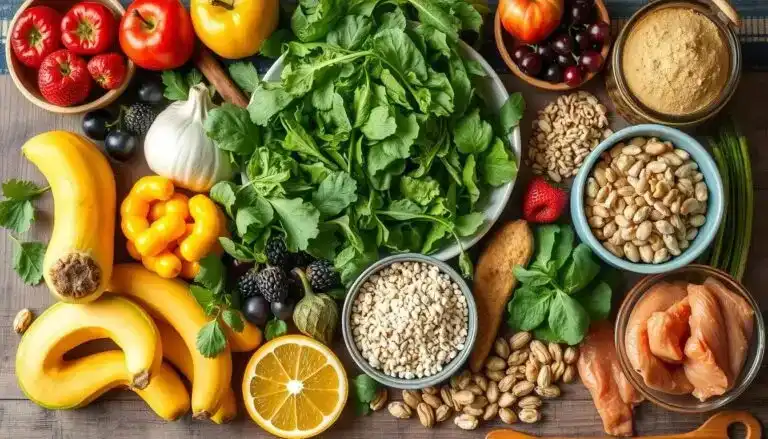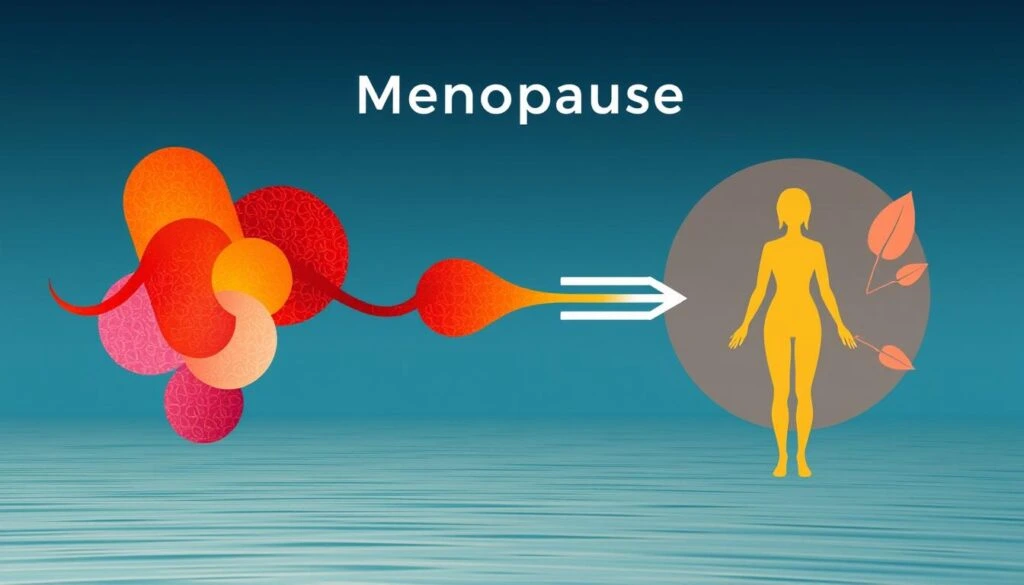Discover a powerful 5-day eating plan designed specifically for menopausal women. The menopause diet 5 day plan to lose weight helps you shed pounds and manage symptoms naturally.
Are you struggling with unwanted weight gain during menopause? You’re not alone. Menopause, a natural stage in a woman’s life, usually happens between 45 and 55. It brings hormonal changes that can cause weight gain.
According to the British Menopause Society, women gain about 1.5 kg each year during perimenopause. This can add up to 10 kg by the end of menopause. This weight gain is mainly due to hormonal shifts, less muscle, and a slower metabolism.
But, a balanced diet and regular exercise can help manage weight during menopause. By understanding the science behind menopause and body weight, women can take control and reach their wellness goals.

Key Takeaways
- Menopause can lead to significant weight gain due to hormonal changes, reduced muscle mass, and slower metabolism.
- A balanced, nutrient-dense diet and regular exercise are essential for managing weight during menopause.
- Incorporating specific foods, portion control, and strategic meal timing can help support weight loss goals.
- Bioidentical hormone replacement therapy (BHRT) combined with lifestyle changes can be an effective approach to address menopausal weight gain.
- Prioritizing stress management, sleep, and overall well-being can enhance the success of a menopause diet and exercise plan.
Understanding Weight Gain During Menopause
Women often gain weight during menopause due to hormonal changes. This weight gain is about 1.5 pounds each year in the 50s. It’s mainly because estrogen levels drop, causing less muscle and a slower metabolism.
Hormonal Changes and Metabolism
Menopause leads to weight gain around the belly, not hips and thighs. With age, muscle mass goes down, and fat goes up. This affects health and well-being a lot.
Common Causes of Menopausal Weight Gain
- Hormonal changes: A drop in estrogen and progesterone, plus aging, causes metabolic changes and weight gain.
- Decreased muscle mass: Losing muscle with age slows down metabolism, making it harder to keep weight off.
- Lifestyle factors: Less exercise, poor sleep, and unhealthy eating also contribute to weight gain during menopause.
Impact on Body Composition
Menopause weight gain often means more belly fat. This fat increases the risk of heart disease, type 2 diabetes, and other chronic conditions.
“Experts recommend at least 150 to 200 minutes per week of brisk walking for moderate aerobic activity.”

Adapting to menopause changes and making lifestyle changes can help. A healthy diet and regular exercise can reduce weight gain and its health risks. Understanding the causes and impact on body composition helps menopausal women find effective weight loss strategies for better health.
The Science Behind Menopause and Body Weight
Women going through menopause face big changes in their hormones. These changes can really affect their weight and how their body stores fat. The decrease in estrogen levels changes how the body burns calories and stores fat.
Decreased Metabolic Rate: With less estrogen, the body burns fewer calories when it’s not moving. This hormonal change also makes fat build up in the belly area.
Also, menopause often brings sleep problems. These can mess with hunger hormones like ghrelin and leptin. This can make people want to eat more, especially foods that are high in calories. Feeling stressed, anxious, or depressed can also lead to eating too much or choosing unhealthy foods.
- Hormonal changes during menopause can lead to a slower metabolic rate, causing the body to burn fewer calories at rest.
- Declining estrogen levels influence fat distribution, resulting in increased abdominal fat accumulation.
- Sleep disturbances associated with menopause can disrupt hunger hormones, leading to increased appetite and cravings.
- Emotional challenges, such as stress and depression, can contribute to weight gain through unhealthy eating habits.
It’s important to understand how hormones, metabolism, and body composition work together. This knowledge is key for finding weight loss strategies for menopausal women. By tackling these issues, women can take control of their weight and stay healthy during this big change in their lives.

Essential Nutrients for Menopausal Women
Women going through menopause need a diet rich in nutrients. This diet helps with weight, bone health, and overall well-being. Eating the right foods can ease symptoms and make this stage easier.
Key Vitamins and Minerals
Calcium and vitamin D are key for strong bones during menopause. Eat 1,200-1,500 mg of calcium daily from anti-inflammatory foods for menopause like dairy, greens, and soy. Vitamin D helps your body use calcium and can be found in sun, fatty fish, and supplements.
Protein Requirements
Enough protein is vital for keeping muscles strong during menopause. Nutrient-dense recipes for menopause should include lean proteins like chicken, tuna, and tofu. These foods boost metabolism and help bones stay strong.
Healthy Fats and Fiber
Eating fiber-rich foods to promote satiety like whole grains, fruits, and veggies helps with weight and digestion. Healthy fats from olive oil, avocados, and nuts balance hormones and reduce inflammation. This makes menopause smoother.
By eating a balanced, nutrient-rich diet, menopausal women can stay healthy. They can also manage the physical and emotional changes of this life stage.
The Menopause Diet 5 Day Plan to Lose Weight
Managing weight during menopause can be tough. But a well-planned 5-day diet can help a lot. Focus on meals that are full of nutrients and support your body’s balance. Here’s a 5-day plan to help you lose weight and feel great.
Day 1
- Breakfast: Oatmeal with fresh berries
- Lunch: Quinoa salad with grilled chicken, greens, and veggies
- Dinner: Grilled salmon with roasted sweet potatoes and steamed broccoli
Day 2
- Breakfast: Greek yogurt with granola and chia seeds
- Lunch: Spinach salad with grilled chicken, avocado, and nuts
- Dinner: Stir-fried tofu with mixed veggies and brown rice
Day 3
- Breakfast: Scrambled eggs with sautéed veggies
- Lunch: Turkey wrap with hummus, lettuce, and sliced veggies
- Dinner: Baked mackerel with roasted Brussels sprouts and quinoa
Day 4
- Breakfast: Protein-rich smoothie with krill meat, spinach, and berries
- Lunch: Lentil soup with a side salad
- Dinner: Grilled chicken breast with quinoa and steamed veggies
Day 5
- Breakfast: Whole grain pancakes with sliced fruit
- Lunch: Sardine salad with mixed greens, tomatoes, and olive oil
- Dinner: Vegetable stir-fry with tofu or tempeh
This 5-day diet plan is all about eating foods that are good for you. It includes lean proteins, complex carbs, healthy fats, and lots of veggies. This way, you can lose weight and stay healthy during menopause.
“The Menopause Diet 5-Day Plan has been a game-changer for me. I’ve been able to lose weight and feel more energized than I have in years. Highly recommended!”
– Sarah, 53
Strategic Meal Timing and Portion Control
Managing weight during menopause needs a smart plan for when and how much to eat. By choosing the right times to eat and controlling portions, menopausal women can boost their metabolism and balance hormones. This leads to effective weight loss.
Optimal Eating Windows
Intermittent fasting or eating within a certain time frame can help. Try to eat your meals in an 8-10 hour window. This lets you fast longer at night, which can improve your metabolism and hormone balance, aiding in weight loss.
Portion Size Guidelines
- Fill half your plate with vegetables for fiber and nutrients, keeping you full.
- Use a quarter of your plate for lean proteins like poultry, fish, or plant-based options. They help with muscle and feeling full.
- Save the last quarter for whole grains, ensuring you get complex carbs.
Using smaller plates can help control your portions. Listen to your body’s hunger and fullness signals. Also, skip snacks late at night when your metabolism is slower.
“Portion control and strategic meal timing are key for managing weight during menopause. By following these tips, you can support your body’s natural processes and achieve lasting weight loss.”
Adding these meal timing and portion control tips to your daily life can change your weight loss game. Combine them with a healthy, balanced diet and regular exercise for the best results.
Foods to Embrace and Avoid During Menopause
Menopause brings big changes, and a good diet is key. It helps with weight, bone health, and symptoms. Eating foods that fight inflammation and avoiding others can help your body.
Foods to Embrace:
- Oily Fish: Salmon, mackerel, and sardines are full of omega-3s. These fight inflammation and ease joint pain.
- Calcium-Rich Foods: You need 1,200 milligrams of calcium daily. Good sources are dairy, leafy greens, and fortified foods.
- Fiber-Rich Foods: Whole grains, legumes, and fruits and veggies are high in fiber. They help you feel full and manage weight.
- Lean Proteins: Lean meats, poultry, eggs, and plant-based foods help keep muscle mass as you age.
Foods to Avoid or Limit:
- Caffeine: Coffee, tea, and soda can make hot flashes worse. Stick to one or fewer drinks a day.
- Alcohol: It can trigger hot flashes and night sweats. It also adds empty calories. Limit it to one or fewer drinks a day.
- Spicy Foods: They can make hot flashes worse. Eat them in small amounts during menopause.
Drinking water helps with digestion and reduces cravings. It also manages symptoms like bloating. Eat whole foods and avoid added sugars and refined carbs for better health during menopause.
Exercise and Physical Activity Guidelines
Regular exercise is key during menopause for weight management and health. A mix of strength training, cardio, and flexibility exercises is best. This helps menopausal women reach their weight loss goals and live healthier.
Strength Training Benefits
Strength training keeps muscles and bones strong, which weaken during menopause. Do strength training two times a week. Focus on big muscle groups like legs, core, and upper body. It helps fight muscle loss and keeps the body healthy.
Cardio Recommendations
Cardio exercises like walking, jogging, cycling, or swimming burn fat and boost heart health. Aim for 150 minutes of moderate cardio weekly, or 75 minutes of vigorous. This is key for menopausal weight loss.
Flexibility and Balance Work
Yoga or Pilates improve well-being and lower fall risks in menopause. They enhance mobility, posture, and stability. These are vital for staying active and injury-free.
With a balanced exercise routine of strength, cardio, and flexibility, menopausal women can achieve their weight loss goals. They can also adopt healthy habits to manage their changing bodies and health.
Managing Menopausal Symptoms Through Diet
As you go through menopause, eating right is key to handling symptoms. Certain foods and nutrients can ease hot flashes, boost mood, and improve overall health. Here’s how diet can help manage menopausal symptoms:
- Phytoestrogens for Hot Flashes: Foods like soy, flaxseeds, and legumes can mimic estrogen. This might lessen hot flashes.
- Calcium and Vitamin D for Bone Health: It’s important to get enough calcium and vitamin D to keep bones strong. Dairy, leafy greens, and fortified foods are good sources.
- Omega-3 Fatty Acids for Mood and Cognition: Omega-3s in fish, walnuts, and chia seeds support mood and brain function, which can be affected by menopause.
- Hydration for Vaginal Dryness: Drinking water and eating hydrating fruits and veggies can help with vaginal dryness, a common symptom.
Limiting caffeine, alcohol, and spicy foods can also help with hot flashes and night sweats. By choosing the right foods, you can manage your symptoms and feel better overall.
| Food Group | Example Foods | Potential Benefits for Menopause |
|---|---|---|
| Phytoestrogens | Soy, flaxseeds, legumes | May help alleviate hot flashes and other menopausal symptoms |
| Calcium and Vitamin D | Dairy, leafy greens, fortified foods | Supports bone health during menopause |
| Omega-3 Fatty Acids | Fish, walnuts, chia seeds | Can improve mood and cognitive function |
| Hydrating Foods | Water, fruits, vegetables | Helps alleviate vaginal dryness |
By choosing the right foods and adding anti-inflammatory ones, you can manage your symptoms and stay healthy. Talk to your healthcare provider to create a diet plan that fits your needs during this time.
Lifestyle Modifications for Success
Menopause brings big changes that affect both body and mind. To lose weight and handle symptoms, you need to make lifestyle changes. These changes help keep you healthy overall.
Managing stress is key during menopause. Try meditation, yoga, or deep breathing to relax. Also, getting enough sleep is vital for hormones and weight. Aim for 7-8 hours of sleep each night.
Talk to your doctor about bioidentical hormone replacement therapy (BHRT). It can ease symptoms and help with weight. Staying active and doing things you love also boosts your mood.
Regular health checks and talking to your doctor are crucial. They can guide you, track your progress, and adjust your plan as needed. A mix of diet, exercise, and lifestyle changes can help you through menopause and reach your weight goals.
Every woman’s menopause journey is different. It’s important to work with your healthcare team to create a plan that fits you. With the right mindset and lifestyle changes, you can take back your health and look forward to the future.
Conclusion
The menopause diet 5-day plan helps manage weight and health during this big life change. It’s about understanding hormonal shifts, eating right, exercising, and changing your lifestyle. Women can stay healthy and fit during menopause with the right approach.
It’s key to remember that everyone is different. Always talk to your doctor for advice that fits you. With the right plan, women can face menopause with confidence and energy.
Using the tips from this guide can help women control their health during menopause. By focusing on self-care, eating well, and staying active, they can reach their weight goals. This also boosts their overall health and happiness.
Seeing menopause as a positive change can lead to a fulfilling life. With the right tools and support, women can come out of this time stronger and healthier. They’ll be more in touch with their changing needs.
FAQ
What are the common causes of weight gain during menopause?
Hormonal changes, less muscle mass, and a slower metabolism are the main reasons for weight gain during menopause. Lower estrogen levels cause less muscle and a slower calorie burn. Sleep issues and emotional changes can also lead to weight gain by making us eat more unhealthy foods.
How can a balanced diet help manage weight during menopause?
Eating a balanced diet is key to managing weight during menopause. Choose foods high in calcium, omega-3s, fiber, and lean protein. Include lots of fruits, veggies, whole grains, and healthy fats to keep you healthy and happy.
What are the components of the 5-day menopause diet plan?
The 5-day diet plan includes meals like oatmeal with berries, quinoa salad, and grilled salmon. It also has Greek yogurt with granola, spinach salad with chicken, and baked mackerel. This plan focuses on whole foods to help manage weight and stay healthy during menopause.
How can strategic meal timing and portion control benefit weight management during menopause?
Eating at the right times, like with intermittent fasting, can help your metabolism and hormones. Also, eating smaller portions and using smaller plates can help control calories and aid in weight loss.
What types of foods should menopausal women include in their diet?
Menopausal women should eat oily fish, foods high in calcium, and plant-based foods for fiber. They should also include lean proteins to keep muscles strong. Avoid too much caffeine, alcohol, and spicy foods to reduce hot flashes.
How can regular exercise benefit menopausal women?
Regular exercise, like strength training and cardio, is vital for weight management during menopause. It helps burn fat and keeps the heart healthy. Adding flexibility and balance exercises can also improve overall health and reduce fall risks.
How can diet help manage menopausal symptoms?
A balanced diet can ease menopausal symptoms. Foods like soy and flaxseeds may help with hot flashes. Calcium, vitamin D, and omega-3s support bone and brain health. Drinking plenty of water and avoiding certain foods can also help manage symptoms.
What lifestyle modifications are important for successful weight management during menopause?
To manage weight during menopause, make lifestyle changes like managing stress, getting enough sleep, and staying active. Consider hormone therapy and keep a strong social network. Regular health checks and talking to your doctor are also important.
